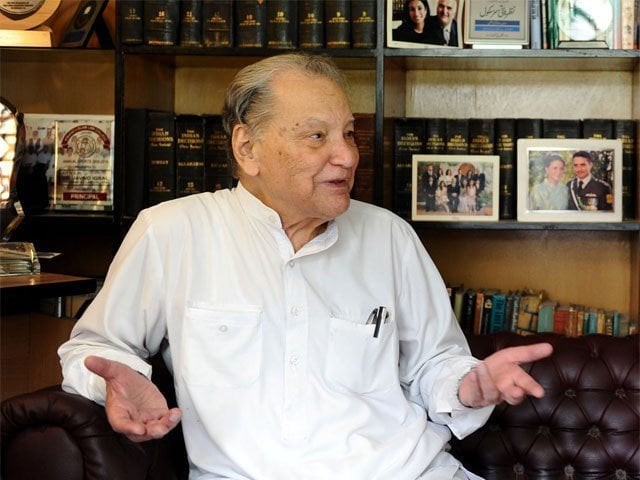The passing of Javed Iqbal
Men of Dr Iqbal’s stature and calibre are a rarity everywhere, and especially so in our country

Justice (retd) Javed Iqbal. PHOTO: FAISAL FAROOQUI
Born in what was then British India at Sialkot in 1924, it was clear from an early age that the law was his calling, and at only 20 he obtained a BA (Hons) from the Government College in Lahore, swiftly followed by a Masters in English and philosophy in 1948 and a PhD from Cambridge in the UK by his thirtieth birthday. He then practised as a barrister in London. He also served three times as a member of the Pakistan delegation at the United Nations in New York. An elected member of the Senate, he also had a stint as the chief justice of the Lahore High Court from 1982 to 1986, and until illness took its toll, he performed services as a senior judge in the Supreme Court of Pakistan, from which he retired in 2011. He was last active in the ‘missing persons’ case, and was chairman of the judicial commission mandated to trace those who had disappeared. His published works centred on the ideology of the state of Pakistan.
Men of Dr Iqbal’s stature and calibre are a rarity everywhere, and especially so in our country. Given his link to one of the most iconic figures who have shaped what Pakistan is as an entity, his passing is all the more sad. Men such as he serve as the role models for the legal minds of today, though there will be few, if any, who will match him. Javed Iqbal was a quiet and unfussy ‘great’, and Pakistan is much the poorer for his loss.
Published in The Express Tribune, October 4th, 2015.
Like Opinion & Editorial on Facebook, follow @ETOpEd on Twitter to receive all updates on all our daily pieces.














COMMENTS
Comments are moderated and generally will be posted if they are on-topic and not abusive.
For more information, please see our Comments FAQ